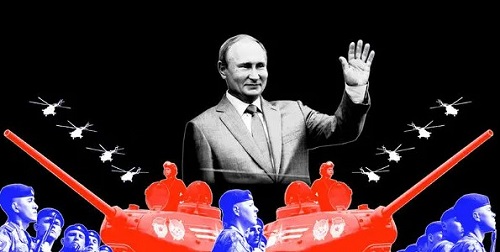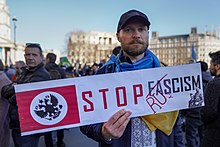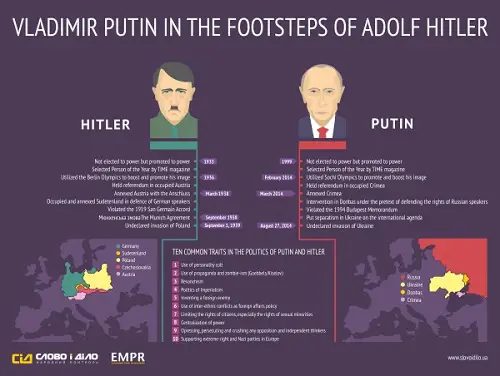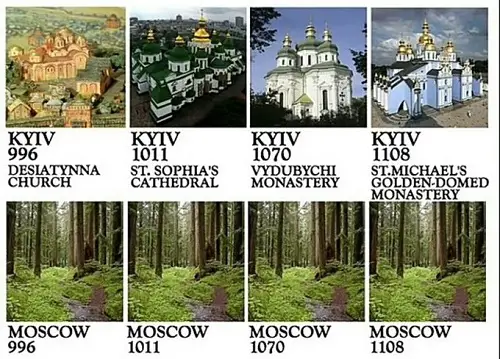|
TRANSLATE THIS ARTICLE
Integral World: Exploring Theories of Everything
An independent forum for a critical discussion of the integral philosophy of Ken Wilber
  Frank Visser, graduated as a psychologist of culture and religion, founded IntegralWorld in 1997. He worked as production manager for various publishing houses and as service manager for various internet companies and lives in Amsterdam. Books: Ken Wilber: Thought as Passion (SUNY, 2003), and The Corona Conspiracy: Combatting Disinformation about the Coronavirus (Kindle, 2020). Frank Visser, graduated as a psychologist of culture and religion, founded IntegralWorld in 1997. He worked as production manager for various publishing houses and as service manager for various internet companies and lives in Amsterdam. Books: Ken Wilber: Thought as Passion (SUNY, 2003), and The Corona Conspiracy: Combatting Disinformation about the Coronavirus (Kindle, 2020).
 How can a smart, compassionate therapist support Putin's fascism?Frank VisserAbstract by ChatGPT. Frank Visser critiques Berlin-based therapist Joseph Dillard's defense of the Russian perspective on the war, accusing Dillard of bias and a lack of multi-perspectivalism. Visser argues that Dillard's work leans heavily towards the Russian viewpoint, neglecting the Ukrainian perspective. Visser also challenges the notion of Putin's self-portrayal as a fighter against fascism, citing experts who label Putin's regime as fascist. The article delves into the complexities of the term "fascism" and its misuse in the context of the Ukraine crisis. Visser emphasizes the importance of a balanced view, highlighting the dangers of groupthink and the need for a comprehensive understanding of the situation. Thou hypocrite, first cast out the beam out of thine own eye; and then shalt thou see clearly to cast out the mote out of thy brother's eye. —Bible, King James Version, Matthew 7:5. In fifteen essays on Integral World Berlin-based therapist Joseph Dillard has defended the Russian view of the war, in an attempt to counteract what he sees as pervasive Western "groupthink". Expressly not to replace it with a balanced and nuanced view himself, and least of all to highlight in turn the Russian or rather Putin's version of groupthink—for in his eyes that would be nothing more than "virtue signaling" and repeating arguments that are already fully represented in the mainstream Western media. However, he also acknowledges that nobody escapes the impact of this phenomenon, and to get to a more objective view of things, every human being needs to transcend its limitation. In ten essays I have tried to refute the main tenets of his writings, or at least show that we still need to make the effort to come to a balanced and fair view of the crisis. Not that either of us has substantially changed his mind—which is in itself an interesting phenomenon. It does show that prolonged debates such as this have limited value, even if the dialectic involved forces one to clarify one's own arguments. For sure there is no better way to do this then to fully explore one's opponents arguments. But we should not leave it at that, and least of all to trade one form of pervasive groupthink for another. And that is what has happened, to my mind, in the case of Joseph Dillard. My main objection to Dillards work is that he, under the flag of “multi-perspectivalism”, (1) describes the "Russian" perspective, (2) uncritically and (3) as if that is the superior one. The Ukrainian perspective is nowhere to be seen. That is far from integral. Of course, “know your enemy” is sound advice, but that is different from identify with your enemy, let alone defend him at all cost. That, unfortunately is what I see happening here. There is nothing multi-perspectival about this. Providing missing pieces to the puzzle does not equal assembling the complete puzzle.  A poster against Ruscism in a pro-Ukraine protest in London's Trafalgar Square So when he stated in his latest essay "Why Smart, Compassionate Germans Supported Fascism", my first thought was: what an excellent self-description! For how can a smart, compassionate therapist like Joseph Dillard support Putin's fascism? This, of course, boils down to a discussion of the meaning of fascism, who can legitimately be accused of it and how is this term of abuse used in the current debate about the Ukraine crisis. In Putin's self-understanding, he is at war with both fascism and Nazism, and Ukraine (including its Western supporters) is brainwashed by these ideologies. Yet, some specialists in Eastern European history have characterized Putin's regime itself as deeply fascist. To quote historian Timothy Snyder's opinion piece in The New York Times: "We Should Say It. Russia Is Fascist."[1] From the NYT article: People disagree, often vehemently, over what constitutes fascism. But today's Russia meets most of the criteria that scholars tend to apply. It has a cult around a single leader, Vladimir Putin. It has a cult of the dead, organized around World War II. It has a myth of a past golden age of imperial greatness, to be restored by a war of healing violence—the murderous war on Ukraine. Fascists calling other people “fascists” is fascism taken to its illogical extreme as a cult of unreason. It is a final point where hate speech inverts reality and propaganda is pure insistence. It is the apogee of will over thought. Calling others fascists while being a fascist is the essential Putinist practice. Jason Stanley, an American philosopher, calls it “undermining propaganda.” I have called it “schizofascism.” The Ukrainians have the most elegant formulation. They call it “ruscism.” Snyder argues that, since "fascism" in Russia is used as a slur to dismiss its enemies, the term has lost all meaning. But the Russian narrative plainly states that Ukraine isn't a real country, that Ukrainians and Russians are brothers and that those who think otherwise must have been brainwashed by the West, and hence deserve to be killed. A very dangerous and inherently fascist ideology. For Dillard, "Snyder seems to be doing an excellent job of reflecting the prevailing Western, integral, liberal, progressive (WILP) groupthink on Russia and the Ukrainian war."[2] His conclusion that "fascism and neo-Nazism are alive and well in the Ukrainian government and military" is based on an extremely partisan reading, completely ignoring how well these descriptions apply to Russia as well. That extreme nationalism can thrive in a country whose very existence is denied and threatened by a former super power does not seem to bother him in the least.
Ukraine must have existed as a society and polity on 23 February 2022, else Ukrainians would not have collectively resisted Russian invasion the next day. (The Making of Modern Ukraine)
SEVEN TALKING POINTSDillard helpfully provided seven talking points that should clarify the difference between a pro-Ukraine and a pro-Russian point of view, and with no exception he sided with the latter. But it is exactly the certainty of his statements that are suspect. I list them here, with Dillards argument, followed by my comments:
Brief as these comments are, they show the hopelesness of reaching a conclusion that is acceptable to both parties, or at least agree on an objective description of the situation. We may as well both rest our case. HISTORICAL COMPARISONSA major part of his essay is devoted to parallels which Dillard sees between the way Germans blindly followed the Nazi ideology, and current Germany blindly following the dictates of the United States. But when it comes to historical comparisons, we might as well point to the fact that Hitler wanted to restore Germany's greatness after the humiliations experienced after the loss of World War I. And isn't Putin exactly trying to restore Russia's greatness after the implosion of the Soviet Union as a super power? What is more, Hitler invaded Sudetenland, a German speaking part of Czechoslovakia, which was allowed by Great Britain in the hope it satisfied his territorial hunger. What it clearly didn't. Isn't Putin rationalizing his invasion of Ukraine with exactly the same type of argument: to "defend" and "rescue" the Russian speaking inhabitants of the Donbas? Well, did they feel "liberated" by Russia? I think not, fake surveys notwithstanding.

Source: Reddit, PropagandaPosters, by ChaosDada
Consider this (taken from the above mostly unreadable graphic):
So while it is true that Nazi Germany was most definitely in the grip of a strong form of groupthink, the same can be said of contemporary Russian society, which gets most of its information about the war from hysterical state-owned television shows, in which the participants openly fantasize about nuclear attacks on Europe. Anyone who has dared to oppose this war, or even call it a "war" instead of a "special military operation" is surely in danger of being imprisoned for a very long time, up to fifteen years. Most Russians don't even care about the war anymore, and have resumed to apathy. Soldiers are mostly recruited from far away Russian republics. Dillard lists ten cognitive biases that afflicted both Nazi Germany and afflicts modern day Germans, and he argues that all ten were at play in Nazi Germany. Furthermore, he argues that modern Germans have simply shifted from one for of groupthink (Nazism) to another (submission to the US hegemony), without liberating themselves from any groupthink whatsoever (if that is possible at all). They are convinced that the United States provides them with territorial safety, as long as they allow the US to have military bases within its borders. How many of these biases have afflicted Putin and his advisors, when they expected Ukraine to surrender within weeks? Or that their troops would be welcomed with flowers in the Donbas? Now Dillard is the very last person to see the great value of Western forms of governance compared to more authoritarian systems, but it pays well to reflect on this. Isn't the Western life style—with all its shortcomings, groupthink and all—very much worth defending? Isn't he fully profiting from the freedoms it conveys on its citizens, for example by writing and publishing his contrarian views, highly critical of the West? Would that every work in Russia, or China, for that matter? No. This smells like geopolitical Blind Spots to me.
In fascist ideology, liberal democracy is itself the existential threat to traditionalism. Putin's willingness to massacre people he falsely regards as his own points to his real enemy: cosmopolitan liberal democracy. (Putin's Fascism, Tablet)
UKRAINE'S DARKER SHADOWSAt the top of his essay Dillard displays a visual that compares a Nazi parade of 1941 Poland with a similar Nazi-inspired parade in 2014 L'viv. This is taken from the article "Nazi collaborator monuments in Ukraine", published in the Jewish magazin Forward, and which in turn is part of a larger series called "Nazi collaborator monuments".[3] It is compiled by Lev Golinkin, a Jewish refugee from Ukraine living in the US. The series shows that Nazi collaborator monuments can still be found in a stunning number of 31 countries (and most probably more): Albania, Argentina, Armenia, Australia, Austria, Belgium, Bosnia and Herzegovina, Bulgaria, Canada, Croatia, Czech Republic, Denmark, Estonia, Germany, Hungary, India, Italy, Kosovo, Latvia, Lithuania, Moldova, North Macedonia, Romania, Russia, Serbia, Slovakia, Spain, Ukraine, United Kingdom and United States! For sure a seriously concerning phenomenon, but there is no need to single out Ukraine in any way. Yet, unfortunately, in his desire to correct the prevailing simplistic "Russia BAD" narrative, Dillard more often than not seems to have become stuck in an equally simplistic "Ukraine BAD" narrative of his own. Let's therefore listen to Golinkin for a different and actually more balanced view. He goes into the hardships the Donbas population has gone through in the eight years before the invasion (one of Dillards talking points), the origin and nature of the Azov brigade, and the Russian invasion of Ukraine (the interview was held shortly after the invasion started).
Democracy Now, Lev Golinkin on Russia's New Offensive & War Crimes in the Donbas by Both Sides over Past 8 Years, 12 apr 2022
From the interview: Over the past eight years the people of Donbas, the industrial heart of Ukraine, have been the victims of bombs, of war crimes... Russia is right now committing a ton of them, I mean the entire invasion is a war crime... None of this would be happening if Russia didn't invade, so the whole, the primary invasion, that's the war crime here. He aptly describes the Donbas population as …having more in common with Western Pennsylvania and Ohio than they do with Moscow or Kiev or Washington. They are proud to be miners, they're industrial, they are steelworkers... These are people who didn't have a problem with anybody and would rather have just been left alone and just being able to work, that's pretty much all they wanted. They have very little to do with either Kiev or Moscow. And the fact that they are mostly Russian-speaking means as much, he says, as that Canadians are English or French speaking, and are still Canadians. He continues: This industrial heartland turned into, I mean if you look at it it, just turned into an apocalyptic wasteland, with both sides just funneling psychopath mercenaries with weapons, bombs, mines and just destroying the entire area. And what's been extraordinarily frustrating for me is, I would watch Russian media, I would look at that and the Russian media would be weeping about the horrible things that Kiev is doing and I would look at Ukrainian media and Kiev would be weeping about the horrible things that Russia is doing. And it's like on a daily basis both sides have just decimated these people of Donbas while simultaneously pretending to care about the welfare of the people of Donbas. Then he discusses the Azov battallion, that originated from neo-Nazi groups at a time when Ukraine didn't have a strong army, and they were well-organized and strongly motivated to fight off Russian mercenaries. But they were white supremacists, and Golinkin minces no words: they should not have received the publicity they received from Western media, and "it is extremely disturbing to see this group being legitimized." And "I cannot stress this enough, support Ukraine, support the people who are not white supremacists, that's the overwhelming majority of Ukraine. Do not support this formation, do not support it because they are white supremacists. They are wonderful for Putin's propaganda." He ends with the following advice: As stupid as it sounds, if you've done everything you can [to support Ukraine], if you're just sitting there you don't know what to do, okay, learn a little bit about Ukraine. Because Putin's entire premise and his entire war effort is to say that Ukraine doesn't exist, Ukraine is basically this backwards area of Russia. You know, a bunch of peasants okay, and what he's trying to do, is trying to say the Ukrainian language is not a language, it's really just a dialect. The Ukrainian culture is not a culture, it's really just just a backward ehm folklore... So in the end it turns out one can condemn both factions of Ukrainian fascism and the brutal invasion of Ukraine by Russia of February 2022, and recognize Ukraine's wish—and fundamental right!—to determine its own course in history. Isn't that, well, what common sense would have advised us from the start? Isn't that what points to what all human beings have in common: to live a decent life, without super powers trying to destroy the very livelihood they have? This should be our common ground, our fundamental agreement about a solution to this war. 
What was first: Moscow or Kiev?
NOTES[1] Timothy Snyder, "We Should Say It. Russia Is Fascist", New York Times, May 19, 2022. Snyder is the author of Bloodlands: Europe between Hitler and Stalin (2010) and The Road to Unfreedom: Russia, Europe, America, and presenter of the superb 23-part Yale series "The Making of Modern Ukraine". [2] Joseph Dillard, "How Will the Delusions and Misrepresentations of the Russian-Ukrainian War End?", www.integralworld.net [3] Lev Golinkin, "Nazi collaborator monuments in Ukraine", Foward, January 27, 2021.
Nowhere is modern Russia's fixation with "phantom fascists" more immediately apparent than in Kremlin policy toward Ukraine. For years, Moscow has equated Ukrainian national identity with fascism while depicting Russian aggression in Ukraine as a continuation of the struggle against Nazi Germany. (Ukraine Alert)
Comment Form is loading comments...
|